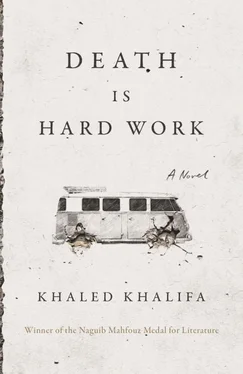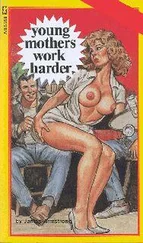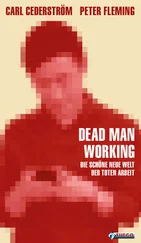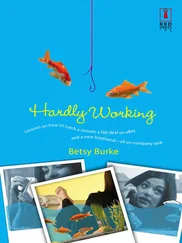After an hour and a half of waiting, the minibus pulled up to the checkpoint proper. The three siblings didn’t speak until spoken to. The bearded agent who poked his head into the van was astonished at the body. Hussein explained everything in a defeated tone, seeking a little more sympathy on account of the rapidly disintegrating corpse. Abdel Latif’s tissues had slackened, and his pores had fissured; his lower half had turned blue, his stomach had inflated, and the stench was overpowering. The agent asked them to pull over on the right and get out of the vehicle. Half an hour later they were a pitiful sight; Fatima was trembling with cold, and Hussein wore an unusually imploring look. No one spoke to them or asked any questions. This limbo of waiting could be so perilous; sometimes, soldiers would drag young men off the buses and spirit them away into nearby buildings before allowing the vehicles to pass through.
Of course, this checkpoint, like so many others, seemed less like a proper checkpoint than a small barracks surrounded by tanks. A short improvised tower was positioned on the barracks roof with snipers stationed inside, observing everyone, perpetually ready to kill. There was thunder in the air, and suddenly it was no longer distant thunder but right on top of them. The storm was approaching, but time was crawling by as usual. Bolbol found himself imagining his family stuck in place for a whole day, or a whole week. It was becoming impossible to believe that their father’s body merited such risk and sacrifice, that it should be treated so respectfully, when death reaped hundreds every day throughout the length and breadth of the country. Who could possibly make such an argument now?
Bolbol exchanged a glance with Hussein that they both understood. Bolbol approached another agent guarding the checkpoint who was smoking calmly and tried to explain their situation to him. They needed to reach Anabiya before midnight in order to be rid of the pestilential corpse. The agent referred him back to the officer inside the building, adding that they couldn’t pass without his permission. The corpse had become an object of revulsion without an identity; it wasn’t merchandise and it wasn’t a person. After death a person becomes a third sort of thing, neither animal nor mineral. Records are closed on their account; they are struck out of the family ledgers with a red line; their belongings are thrown into garbage bags or picked over by scavengers from near and far. No one asks old bedsheets about the warmth of the bodies they once protected in the heat of passion. After the file is closed on a dead person, all these little details are shed piece by piece by the memories of the living. Everything is consigned to oblivion and nothingness.
Bolbol went to the officer in charge with an attitude of supplication. In a trembling voice, he explained that time was of the essence; he spoke about the dignity of the dead, not mentioning that they were stuck with this corpse if they couldn’t reach Anabiya. He made himself look wretched, begging without complaining. He hated how naturally the pose came to him; a brave man would say something different, would affirm his right to move about freely and take his father’s body to its graveyard in good time…
The officer looked at Bolbol coldly, used to the blandishments of those who had fallen inside his trap. As far as he was concerned, all these people hated him and wouldn’t have any mercy if their situations were reversed. The roles of executioner and victim were eternally being exchanged, were they not?
Bolbol thought of the pouring rain and raging storm outside. Night would fall soon, and they wouldn’t be able to finish their journey in this weather. The officer said that transporting bodies in this fashion was forbidden, but because he believed that they were acting without malice, he was waiting for confirmation of the death certificate. Bolbol offered to try and get the pronouncing doctor on his cell phone, but the man in charge cut him off sharply: “Life and death are only a matter of official documents.” He pointed at the fax machine on his desk. Bolbol asked permission, again, to call someone at the hospital who might be able to expedite matters, and the officer nodded his acquiescence. Bolbol dialed the doctor’s number and explained the problem to him. The doctor promised to look for the fax from the checkpoint and to get back to them as quickly as possible.
Bolbol had almost no money left; he blamed himself for having wasted it, for not having properly calculated the cost of their long journey: he should have divided the sum between the total number of anticipated checkpoints. They had nothing they could sell here—Bolbol’s phone was ancient and wouldn’t fetch more than a thousand liras, while Hussein would never relinquish his phone for any price—and the two thousand liras left in the siblings’ collective possession wouldn’t get them anything. The doctor called back and told Bolbol that the hospital’s fax machine had been out of order for three months. Only then did Bolbol remember Fatima’s ring and wondered how much it might fetch. He went back out into the driving rain and explained the situation to Hussein and Fatima, who were huddled in the minibus for shelter, but still soaked right through. Fatima had slipped her feet under the blanket that served as their father’s shroud. Hussein explained that he couldn’t turn on the heat; they needed to save gas.
They all looked at one another, acknowledging that they were lost in the wilderness, until an agent rapped on the bus’s window and gestured at Bolbol to get back out. The agent returned the documents to him and said that a fax had arrived from the hospital; the officer was allowing them to proceed. They couldn’t believe they were being allowed to go on their way. The minibus set off, and Hussein put as much distance as he could between themselves and the checkpoint. He regained his good spirits, and Fatima muttered strange litanies and asked him to look through his cassette tapes for a prayer for traveling. Hussein didn’t reply; he was busy speaking to one of his friends on the phone, telling him the name of the village they’d passed through a few minutes earlier. His friend told him there were still ten kilometers until they reached the final regime checkpoint. After that, they would enter the territory of the Free Syrian Army. Hussein focused on the road. The rain stopped, but the wind picked up speed; it tilted the minibus, and the corpse began to topple. Bolbol grabbed it before it could fall over and considered laying it flat on the floor. He dismissed the idea, however; to move it would be to risk revealing even more of its decay. They did their best to ignore the stink, though they were on the brink of passing out: the cologne mixed with the corpse’s odor weighed the air with a putrid, lethal stench, and the biting cold outside prevented them from opening any windows.
Each sibling was too ashamed now to admit that they regretted ever setting out on this journey. Why hadn’t they looked for a more convenient graveyard, or maybe called one of those charities that volunteered to finance burials for strangers to the city?
Their silence also made it clear just how little they could stand spending so much time with one another. An entire day was intolerable; there was nothing left in them of the affectionate siblings of old. The ties of blood simply weren’t enough to sustain the falsehood of family harmony given all the things that now divided them—a lie that in any case had disintegrated long before. When Hussein told their father what they were all thinking, back then, he paid the price of his recklessness; Bolbol meanwhile kept trying to live the lie of respect and the sacred family bond. There were many times he would have liked to tell his father that he was cruel to his children and kind only to his students and strangers. The image Abdel Latif presented to the world was paramount; he cared too much about what people said about him and believed only the best of what they said. He didn’t respect his children’s weaknesses because he didn’t remember his own, nor his old inability to escape with Layla from his own family’s influence. He had waited for her to turn to ash before he let out a stifled cry and left Anabiya for good—Anabiya, where now he wanted to be buried. Bolbol wanted to ask him: Why, after you left it all behind—those cruel faces that knew no mercy—why would you want to be buried on their cursed land?
Читать дальше












